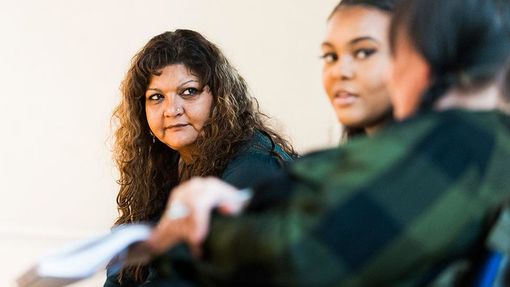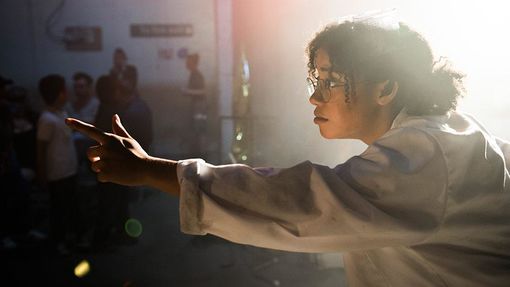Project Pathfinder
Today we are speaking with Luca Newman a current student on the Writing for Performance, BA course, about working on Project Pathfinder as part of their second year Collaborative Outreach placement.
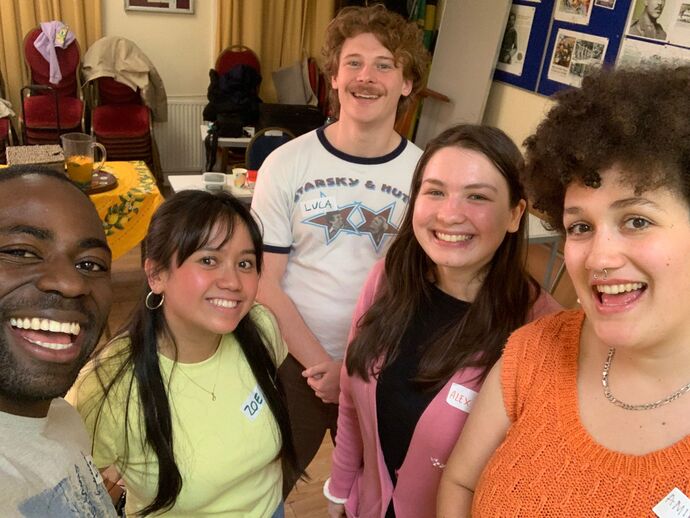
Tell us about your project!
I was on my second year placement for Collaborative Outreach, working with Seven Winds CIC on Project Pathfinder at The West Indian Association for Service Personnel in Clapham. It is a community histories project with the aim to create an archive for stories that challenge the dominant narrative.
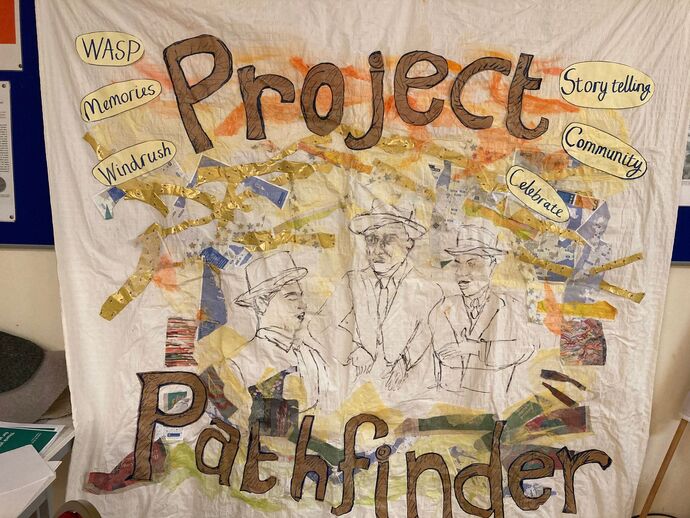
What made you want to get involved?
Central selected us for our groups based on the interests we’d shown throughout our degree, and areas we wanted to learn more about. Throughout my degree I’d shown an interest in the history of colonialism and imperialism, and I wanted to learn more about processes of recording history, accessing archives, and experience as a researcher.
I was introduced to Seven Winds CIC by Central, alongside 4 other students. We joined Norman Bailey of Seven Winds CIC on his upcoming Project Pathfinder. Seven Winds CIC offered a community outreach programme involving taking oral testimonies from Windrush generation community centres. Though that was the original aim, it grew into something far more expansive.
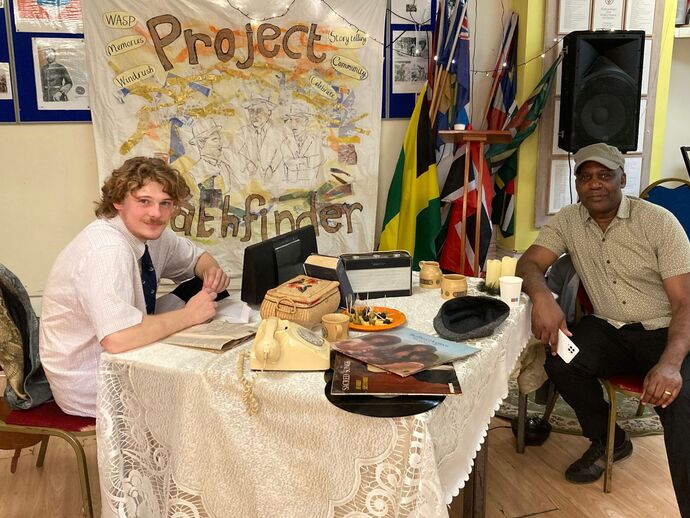
What did you get up to?
In the research stage of our project, we were introduced by the host Norman Bailey to the term Pathfinder. He defined it as ‘a pioneering member of a family or community who goes ahead to navigate safe passage for others to follow.’ The definition now takes a metaphorical meaning, but it originates from the Royal Air Force’s ‘Pathfinder squadrons’, who flew ahead of the ‘bomber squadrons’ to scout for enemy aircraft, as well as marking targets for the bombers to attack. In ‘Remembrance Day Pilots of The Caribbean’, the RAF Museum reuses the term ‘pathfinder’ in reference to John Blair, a pathfinder for his people, who overcame racism just as he had ‘struggled through flak and enemy fighters.’ They also name Corporal Sam King (later Mayor of Southwark) who set up ‘pardner schemes’ to aid Windrush migrators in their journey. The term ‘Pathfinder’ was the keystone of our project, from which we devised four creative workshops in the buildup to Windrush Day.
In week 1, we introduced ourselves at the community centre. We had planned a series of creative exercises, but initially our participants were not keen to get involved. We then scaled back our approach in the moment to be far more colloquial. Instead of attempting traditional facilitation, we just began chatting. We found that certain participants who were previously disinterested were actually very excited to tell their own stories, and by the end of the session we had recorded two long-form oral recordings.
In week 2, we carried on where we had left off, and with a pre-established relationship of trust, we were given oral testimony from a wider range of participants. Some gave their families histories, while others only felt comfortable telling us their favourite songs, foods, and places in London. Though a song may seem small, songs reflect a culture and a feeling that is vital to learning hidden histories.
In week 3, we prepared a miniature performance made from the subjects we’d learnt about in the oral histories. We used verbatim theatre methods, and used the songs and settings they’d volunteered to guide the story. During the piece, the audience felt compelled to shout out extra information about the jobs they’d had, the places they’d been. and the way Britain had treated them. Through the performance, not only were we given extra pieces of history, but we also created excitement in the community for our return on Windrush Day, when we’d perform a 20 minute play based on our time at the community centre.
In week 4, all of our work came together. We created a soundscape that played in our version of a ‘front room’, based on Michael MacMillan’s Front Room at the Museum Of The Home. He personally advised us on important objects and their significance in Windrush generation homes. We then transformed the exhibit into a stage, and performed a 20 minute story based on our time at the community centre. I cannot quote our participants for privacy reasons, but there was an overwhelming amount of positivity, and many said we should take the project forward for further performance, so their children and grandchildren can witness and understand their stories.
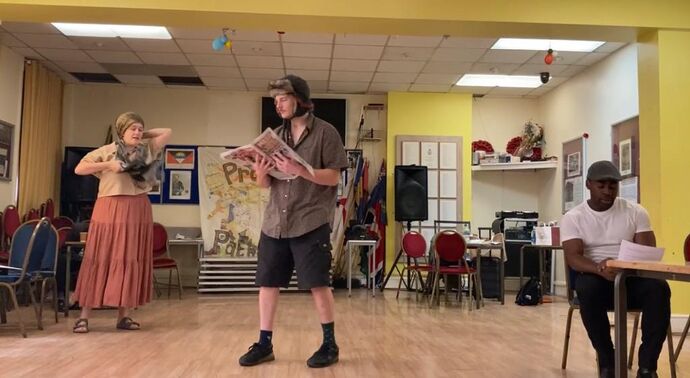
How is this project, activity or placement related to your coursework?
As a writer, it was important for me to learn about devising in community contexts, and the ethics of representing the stories of others in a responsible way. For my colleagues on the Drama, Applied Theatre and Education, BA course (Amirah Samer, Israel Mokwe, Zoe Bilog Zaragoza), it was a chance for them to test out the facilitation skills that they’d learnt throughout their degree. Alex Fitzerman is currently carrying on her work with Project Pathfinder as part of her Writer In Residence module in third year.
What has surprised you most about your experience?
The most surprising part of the project for me was the noticeable impact we’d made. I had previously been a cynic about the impact of art, but I now realise I just hadn’t been looking at the right art.
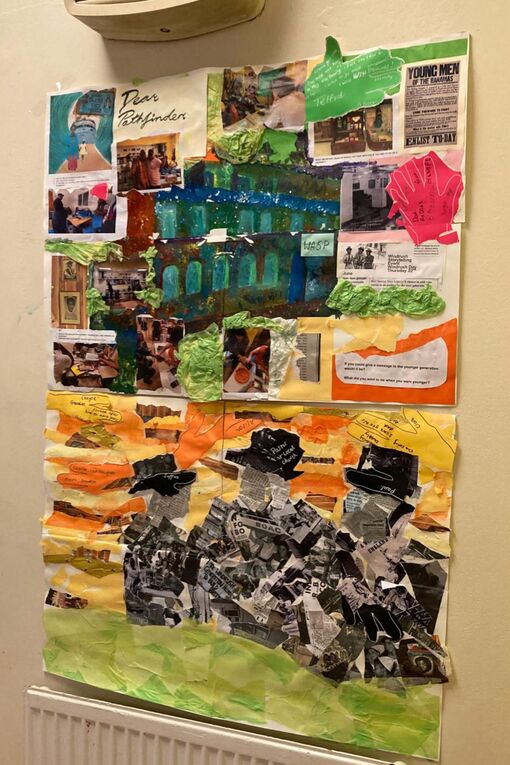
How did you find out about Central and decide to study with us?
I found the course online when I was looking for London stage and screenwriting degrees. Central’s Writing for Performance course appealed to me most because in addition to the tutoring for script writing, it also offered multiple opportunities to gain work experience in the theatre industry, and beyond. Having worked with more than four companies in my time on the course has given me confidence, contacts, and direction, going into the ‘real world’ post-graduation.
What are you planning to do after graduation?
After graduation, I hope to continue writing in any form I can. Completing this project has opened up the community project path for me to take. I hope I will be able to collaborate with Seven Winds CIC again in the near future.

